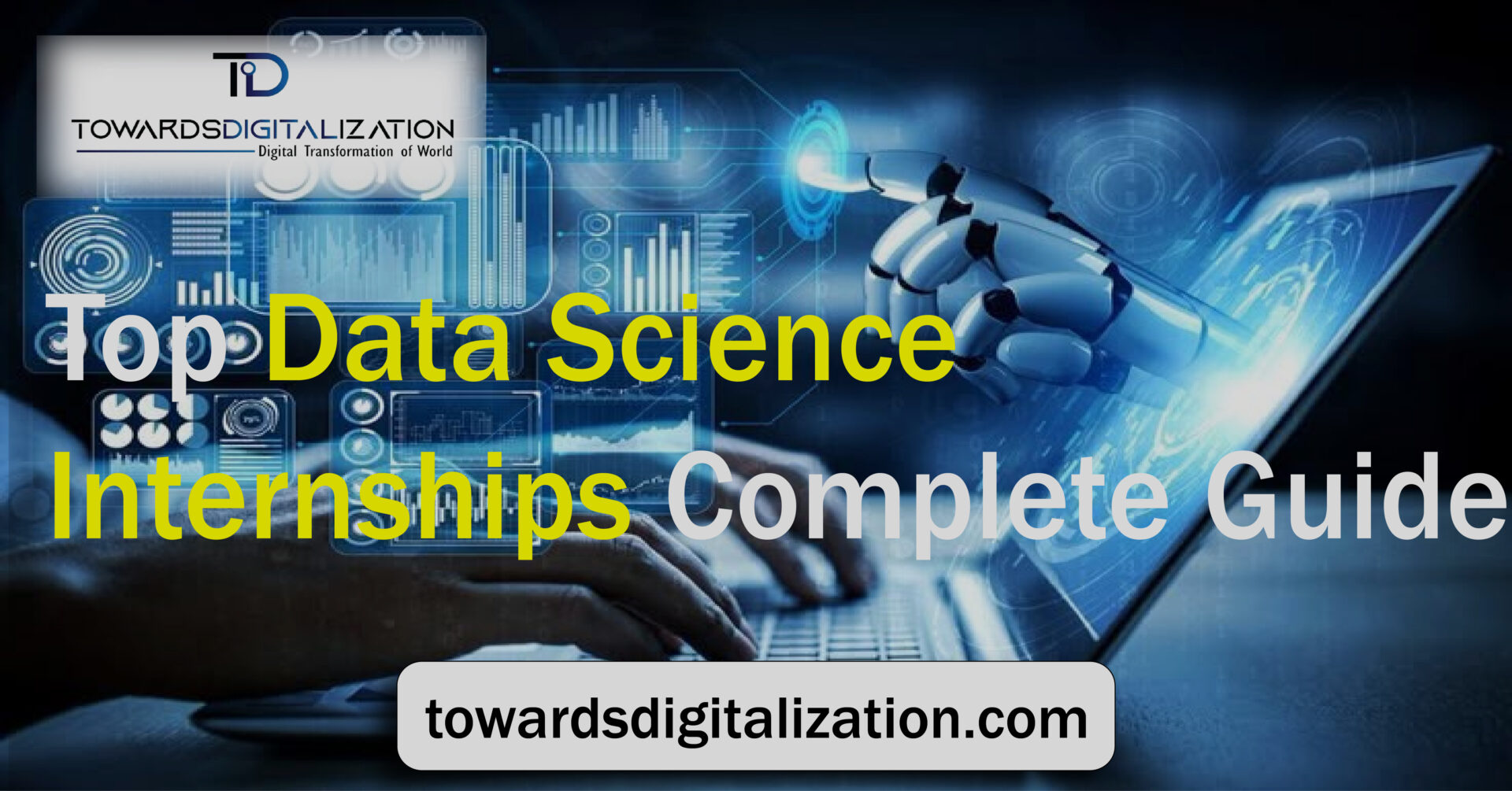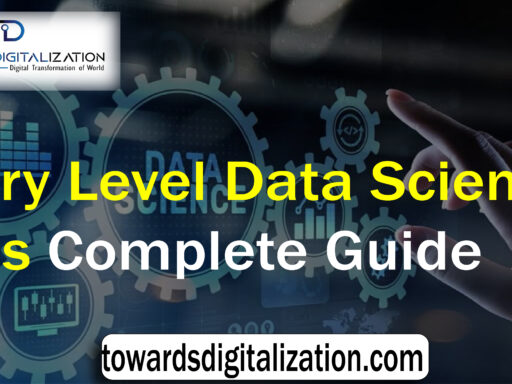Introduction
We’re in the data age, and it’s changing everything. Strategic planning and competitive advantage result from the decision makers having insights drawn from the field of data science,which in turn, is causing a surge in demand for professionals who handle data. This has meant that there is a plethora of jobs for fresh graduates and students who wish to make their mark in this rapid growing field. Internships: Internships are a good method to get into data science and technology as they provide on-hand experience.

Data science careers offer students an excellent combination of academic study and professional experience. By participating in real life projects and networking with experts from different areas. As well as developing an in depth knowledge of techniques and tools utilized within this discipline. A data science career could become even more essential by 2026 given global digital transformation trends and rapid technological development such as artificial intelligence, machine learning and large scale data analysis technologies.
Essential Skills for Data Science Internships
A mastery of Python as well as SQL is required of anyone working in data sciences. Python’s ease of use makes it popular. While access to robust libraries such as NumPy Pandas and Scikit learn are both easily available through it. Meanwhile SQL plays an essential part in database administration. As well as data retrieval using Git or Jupyter Notebook can significantly boost employee efficiency and productivity.
Analytical Thinking and Statistical Knowledge in data science
Students engaged in data research must possess analytical thinking abilities. In order to examine complex datasets, identify patterns within them, and draw meaningful findings. A background in statistics and probabilities will allow interns to interpret information distributions such as confidence interval tests of hypotheses testing as well as measurement indicators as well as develop evaluation theories while taking informed decision making practices.
Communication and Data Visualization
Communicating effectively about data analysis requires more than simply being exposed to it; interns should also possess the abilities needed to effectively present findings to teams or stakeholders who may not possess technological know how. Matplotlib, Seaborn or Tableau tools offer incredible ways of creating eye catching visualizations which showcase findings efficiently; verbal, written communication will be essential when sharing findings to other parties such as teams or stakeholders who may lack technical know how.
Top Sources to Discover Data Science Internships
Websites have become one of the primary destinations for those searching for data science jobs for students, such as LinkedIn, Glassdoor, Internshala and Indeed. These websites allow users to sort listings based on location, business type, experience level. Also they make searching faster and more effective overall.
Company Career Pages and Recruitment Drives
Many businesses advertise internship and recruitment positions for interns directly on their websites, with companies like Google, Microsoft, IBM and Amazon often featuring specific internship programs within their career sections. Some firms even run recruitment drives targeted specifically towards college students interested in data science or analytics fields – these could provide potential internships.
Academic and Networking Channels in data science
Universities typically provide placement services which work with various organizations to give students internship opportunities. Participation in contests for data scientists such as webinars or workshops could provide networking opportunities, while Twitter or GitHub platforms might allow individuals to meet professional with similar interests potentially leading to mentorship or intern placement opportunities!
Companies Offering Data Science Internships by 2026
Companies of global significance that specialize in technology are some of the world’s premier recruiters in data science. Many Companies like Google, Microsoft, Meta and IBM offer structured internship programs which equip students to master advanced algorithms for data analysis as well as machine learning pipelines and the cloud analytics services provided. Such internship programs require students to possess both theoretical as well as practical understanding.
Consulting Firms and Financial Institutions
Consulting firms like Accenture, Deloitte, and McKinsey employ interns to analyze client data in order to create dashboards as part of business intelligence tasks. Banks like JPMorgan Chase or Goldman Sachs offer similar internships that focus on customer analytics or risk modeling. They look for applicants that can apply the methods of data analysis within a business setting.
Startups and Local Tech Companies in data science
Internships at startups provide students with valuable experiences that foster active engagement while taking on multiple responsibilities while learning through active involvement. South Asia-based startups such as Bykea, Airlift or Bazaar provide internships focusing on data collection visualization experiments experimentation as well as experimentation without formal instruction, giving interns plenty of chances to learn in fast paced working environments.
Prep Process and Applications Tips
A professionally designed resume which highlights both academic and personal accomplishments is crucial in landing any position of interest, from data science research projects on GitHub to personal experiences within various companies and positions of employment. An additional personal touch would be an eye catching cover letter which shows your interest for both topics together something your resume shouldn’t miss!
Showcasing Projects and Online Certifications
Employers tend to place greater value on experience gained through work than academic grades. Employers will assess your abilities by viewing interactive dashboards of data. Algorithms for machine learning and notebooks of analysis that showcase your talents. Acquiring certifications on platforms like Coursera, Udemy or edX in data science. Python programming or analytics also can establish your name in this space.
Preparing for Interviews and Technical Evaluations
An internship interview for data science typically features tests designed to test both behavioral and technical abilities of candidates, with possible challenges like solving coding related challenges or outlining processes to analyze data or present it for analysis. Revision of classification, regression cleaning and clustering concepts such as classification is crucial; mock interviews on platforms like LeetCode will further increase efficiency.

Certifications That Increase Internship Opportunities
Google Data Analytics Professional Certificate and IBM’s Data Science Professional Certificate offer individuals who are just beginning their knowledge base a well planned path, beginning from data manipulation basics all the way through machine learning models creation perfect for students eager to get going!
Specialist Skill Based Courses in data science
Courses that specialize in specific instruments or areas of specialization like SQL for Data Analysis, Python for Data Science or Excel for Business Analytics help interns stand out during interview processes and become more productive on day 1. Certificates demonstrate commitment to learning essential skills necessary for productivity while aiding interns become productive more quickly on Day One.
Participating in Data Competitions and Hackathons
Engaging in data competitions such as Kaggle or HackerRank can give data scientists some exposure in their chosen field of information gathering. Participation or winning such competitions demonstrates your proficiency at solving problems under pressure while showing resilience under stress qualities which make a strong addition to resumes for practical skills showcasing.
Exploit Internship Experience to Advance Development and Learning
Internships enable students to face real life data challenges that go far beyond anything found in books and textbooks. Students learn to navigate issues associated with incomplete or disorganized information sets; address ethical considerations when collecting data; as well as ensure models function optimally these challenges provide invaluable opportunities for self confidence building and personal growth during an internship experience.
Teams of experienced professionals
Interns often interact with researchers, data engineers and analysts; such interactions allow them to gain knowledge on how best to practice studying new technology. As well as understand its importance when collaborative efforts involve data. Seeking guidance from an experienced professional may prove instrumental for student’s development and career growth.
Personal and Career Clarity
By the time they complete their data science education. Most students have gained insight into which field of data science they prefer working in, such as data engineering, analytics, machine learning or visualisation. Internships provide opportunities to clarify long term goals while providing insight into future career objectives.
Common Challenges Facing Internship in Data Science
Any students find their first data science job is their initial opportunity at any organization. Adjusting to messaging design, reporting style and expectations may seem intimidating at first, but with guidance and time they will soon discover ways they can perform professionally and contribute toward its success.
Managing Learning Curves and Pressure
Interns often face steep learning curves and face numerous challenges when dealing with unfamiliar tools or huge code bases, so ensuring tasks get finished in time requires effective time management skills as well as seeking outside aid to overcome issues quickly. To do so, interns need to use whatever tools are readily available in their professional environment for solving them efficiently.
Limited Access to Projects or Data
Due to security and confidentiality considerations, interns may be denied full access to databases or vital company data. Instead, companies often offer simulation projects called Sandboxes; although these don’t always reflect actual information as accurately, these settings provide excellent educational experiences.
Online Training Platforms Offering Courses and Internships
Coursera, EdX and Udacity Well-established learning platforms online such as Coursera, EdX and Udacity provide structured courses on data science from top technological companies and universities. Their offerings may include Capstone assignments, practical laboratory exercises or virtual internships which simulate real life situations – these platforms may even include certification programs which help build your personal profile further.
DataCamp and Kaggle Learn
DataCamp and Kaggle Learn For college students interested in practical aspects of learning platforms, DataCamp and Kaggle Learn offer bite-size lessons with interactive notebooks in bite-size chunks – DataCamp workshops cover Python, R, data engineering as well as contests over open data sets on Kaggle. Both platforms can help develop foundational skills as well as portfolios.
ArteAnalytics Provides Specialized Learning and Internship Opportunities
ArteAnalytics can be described as a website dedicated to professional development and internship opportunities within data science and analytics. With classes tailored for beginners as well as advanced levels covering topics like Python for Data Science, Exploratory Data Analysis, Machine Learning and project implementation. ArteAnalytics is dedicated to professional growth as a career opportunity, with its internship program giving students opportunities to use what they learn directly in professional settings.
ArteAnalytics helps students not only acquire theoretical understanding. But also use actual data in order to construct predictions and reports that complement internship programs. Real world knowledge bridges the gap between content and expectations of business industries. While experts with expertise in data enhance both learning process as well as increasing your chances of achieving career goals set for themselves.
Conclusion
An internship in data science can provide the launch pad to an exciting career in machine learning, analytics and AI. Internship programs equip participants with both knowledge and skills necessary for real world application. As well as providing insight into information related jobs that use it for insights with companies increasingly turning to data for vital insight to make key business decisions. So engagement in an internship program in data science before 2026 could prove fruitful in building lasting careers in this industry.
Data scientists who combine technology expertise, preparation and the desire to continue learning may find themselves the job that fulfills them most satisfactorily. No matter whether working for an international corporation, small startup in your locality, freelance online job training experience or freelance online job learning opportunity; your knowledge gained during work may play a pivotal role in shaping your professional destiny.
Frequently Asked Questions:
Question 1. What exactly is the purpose of a Data Science internship?
Data science jobs are an experience of professional education in which students and beginners are able to are working with actual data under expert guidance. This helps them comprehend the data collection, cleaning models, and analysis employed in industry.
Question 2. Who is eligible to apply to be a candidate for an internship in data science?
Anyone who is familiar with the basics of the tools used in data science and ideas can benefit from. Students studying statistical science, computer science or other related disciplines, and transitioning into a new career after some education or the completion of a course.
Question 3. What is the length of these internships for data science run?
Internships typically last between eight to twelve weeks. But, there are some that can last for up to six months especially. When they include the research aspect or belong to the university’s program.
Question 4. Can beginners get data science internships?
There are many organizations and platforms provide entry level jobs that are designed specifically for novices. Online certifications and personal projects or GitHub portfolios could greatly enhance the chances of getting.
Question 5. What should I know about the various tools prior to submitting?
You must be familiar with Python or R libraries. Such as Pandas, Matplotlib, and Scikitv learn SQL to store data, as well as Jupyter Notebooks for experiments. The basics of ML as well as data visualization abilities can also be useful.
Question 6. Are remote data science internships effective?
Remote internships can be extremely effective when you are on track and do the work correctly. Most remote programs provide mentorship along with live projects as well as feedback via online platforms.
Question 7. Can internships in data science be a path to permanent jobs?
Achieving a high level of performance during your internship is often the basis for jobs, particularly within larger companies. They also help build your resume, and can help you establish strong connections in the industry.
Question 8. Where can I look for Data science related internships?
You can find internships on LinkedIn, Internshala, Indeed, Glassdoor, company websites, or training platforms like Coursera and ArteAnalytics, which offer internship integrated programs.
Question 9. Are ArteAnalytics a suitable place to find internships in data science?
Absolutely, ArteAnalytics offers hands on classes and internships based on projects. Students can apply their skills to data from real life. As well as receive guidance and gain experience in the industry. Which makes it an excellent option for those who are just starting out.








